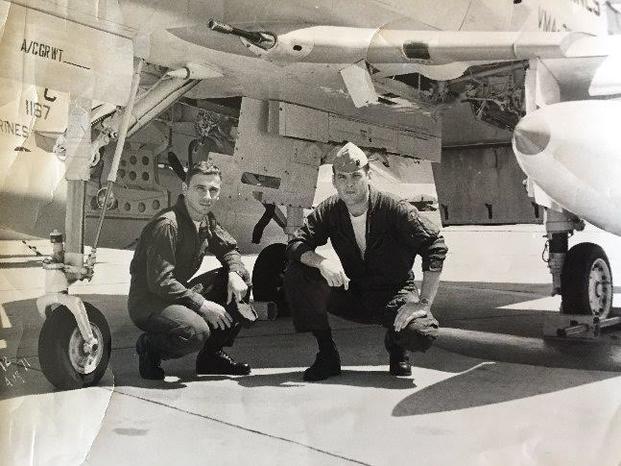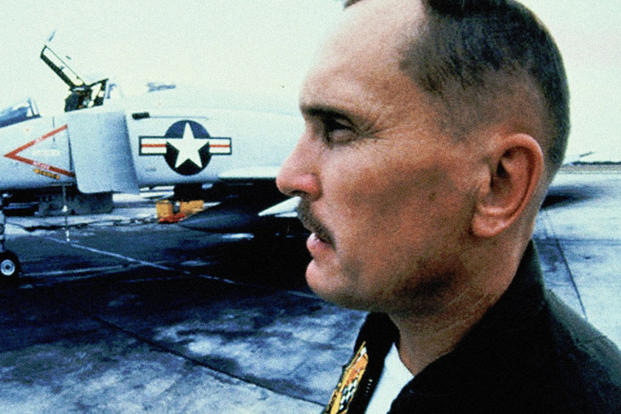The son of a Marine Corps officer who served with “The Great Santini” offers his thoughts on the impact the colorful colonel had on his family, and other Marines.
"The Great Santini" is one of my all-time favorite military movies. Not just because I’m a big fan of actor and Army veteran Robert Duvall, or because it’s a movie that grapples with the dilemma of “warriors without wars,” but mostly because it opened a door to my past.
"The Great Santini" brought me back to Beaufort Marine Corps Air Station where my father, Larry Brown, was a young 2nd Lieutenant and pilot with the kickass F-4 squadron VMFA-312, and where I was born, literally, into the brotherhood of Marines during the Vietnam War.

It took the brilliance of Duvall, whose character “Bull” Meechum was inspired by my father’s commanding officer, Colonel Donald Conroy, to bring us closer together. Duvall’s portrayal of Meechum gave me a better understanding of the generational differences and difficulties my father (and mother) endured during a tumultuous time in American history.
I Am the Great Santini!
"The Great Santini" is the story of fighter pilot Colonel “Bull” Meechum who returns from the Korean War and has great difficulty re-assuming his role as a husband and father. The Great Santini is based on the book of the same name written by Pat Conroy—the son of Col. Conroy.
Robert Duvall was kind enough to write a note about his experiences working on the film and inhabiting the role of “Bull” Meechum.
Says Duvall, “It was great working on this film years ago and very interesting to portray real-life figure, Col. Conroy—what a character!”
Duvall also states that he appreciated working with Marines and that they are an outstanding group of men.
Duvall a Natural for the Role
Duvall was well-suited for the role—his father was career Navy and retired as a Rear Admiral. Like the Great Santini’s family, Duvall was used to moving from duty station to duty station.
In an early scene, “Bull” Meechum paces slowly in front of his four kids in his crisp Alpha uniform. As he taps a swagger stick in his hand menacingly, he says, “I know it’s rough to leave your friends and move every year, but you are Marine Corps kids and can chew nails while other kids are sucking on cotton candy.”
“Bull” Meechum’s hard-nosed child-rearing mimicked my father’s approach to discipline in a biblical, corporal punishment way. “Bull” Meechum’s actions however, grow darker and more abusive throughout the film, culminating in a pivotal scene with his eldest son, Ben, during a true-to-life one-on-one basketball game.
The Gift of Fury
When his son wins the game, “Bull” Meechum shoves his him into the wall. His daughter Mary Ann (played by Lisa Jane Persky) says, “Nice game dad” to which he replies, “Get away from me or I’ll knock every freckle off your face,” as he shoves the basketball at her. He then tries to change the rules of the game because he cannot stomach defeat, not even in a simple basketball game with his son.
When his son doesn’t play along and leaves the court, the Great Santini berates him, saying, “You’re my favorite little girl” and “Go ahead cry, squirt a few” as he follows his son inside the house all the while bouncing the basketball off the back of his son’s head.
This is scene is particularly moving for me. My father believed as Col. Conroy and “Bull” Meechum believed. He wanted to give me, as “Bull” Meechum says, the “gift of fury” and that he wanted me to “gobble up the world, eat life or it will eat [me].”
Col. Conroy and his son Pat were both on set for the filming of this scene. A woman on the set asked Col. Conroy if he and Pat had really played games like that. Col. Conroy replied, "Every day, madam. Every single day."
To this day, that scene brings tears to my eyes.
Take the Warrior Out of the War, but Not the War Out of the Warrior
“Bull” Meechum and Col. Conroy (and my father to some degree) were warriors that didn’t handle failure well, and often took their aggressions out on family members seemingly without explanation, remorse, or apology. The life of Col. Conroy also illustrates the difficulty of transition, as in when “Bull” Meechum verbally or physically abuses his family, or when he gets falling-down drunk.
A paradox of war is that many who are good at it are not so good being away from it. The reason, scientists say, is the human brain's innate ability to rewire itself during prolonged periods of extreme stress or combat. It’s a survival mechanism.
Many veterans who have ever served during a time of war will tell you the same thing—the military does a great job training you to fight, but when the fight is over, reintegrating back into the day-to-day humdrum of life stateside is foreign territory.
The redemptive beauty of coming to this understanding, for me—as a Marine war veteran, son, and now a father—is that I can forgive and become a better son and father.
Marines Are Family
Some of the officers who served under Col. Conroy’s command agree that what Col. Conroy lacked in spit-and-polish, he made up for by engendering esprit de corps and respect.
My father says, “We [pilots] were an extension for the son he wished he had. He led us as his sons—no women in those days—and led us accordingly, but could be volatile if disappointed.”
My father also says that Col. Conroy could “turn violent if he felt you were disloyal to him or the Marines.”
He remembered a Marine major who performed very well in carrier qualifications, with the Navy asking him to resign from the Marines and join the Navy. When the major asked Col. Conroy for a transfer, he blew up and lunged at him, only to be saved by a first sergeant who quickly ushered him out of the office.
Says my father, “He counted it a personal betrayal. He had a dislike for the Navy and didn’t want to be second to any other command.”
So in the opening scene of "The Great Santini," when Col “Bull” Meechum is in a Marines versus Navy dogfight and you hear him shout, “Watch out rust-pickers,” and “Watch out squids,” it’s not friendly rivalry, it’s pure contempt.
Col. Conroy Knew Everyone’s Name
Col. Conroy had a superb memory and an exceptional ability to recall personal experiences from individuals. They also say he was a gifted orator and could give a rousing impromptu speech.

Vietnam and Gulf War Marine Colonel John “Hunter” Bioty (ret.) arrived to Marine Aviation Detachment in Pensacola Florida in 1968 (my father and Col. Bioty served together). He recalls his first all-hands meeting, where Col. Conroy asked his pilots to tell them their names and a little about each of their backgrounds.
“I told him my name and that I was from Vermont and graduated from Holy Cross College,” says Bioty. “Much later, when I went back to Pensacola for carrier quals, I ran into Col. Conroy at the Base Exchange. I said ‘Good morning sir,’ and he pointed his finger at me and said, ‘Hi John, from Vermont who graduated from Holy Cross.’ I was stunned.”
Bioty says that his other classmates had a similar experience. Once you were introduced to the Great Santini, he never forgot you. Later, Col. Bioty would have the privilege of returning for a squadron retirement ceremony to roll up the VMA 331 flag along with all the former COs, including Col. Conroy (Bioty commanded the mighty VMA-331 from 1988-1990).
A Warrior’s Redemption
In "The Great Santini," Ben witnesses a friend die at the hands of a local racist and instead of responding with compassion, “Bull” Meechum berates him for “disobeying a direct order” and leaving the house. This confrontation leads to the realization that he has failed as a father and Marine, prompting him to get into a drunken fight with his wife Lilian, after which he storms out of the house.
Later, Ben is sent out by his mother to find his father, and finds him slumped behind a tree. He stands at a distance and listens to his father break down and cry. Ben comes to realize that while his father couldn’t express his love with words, he was showing his love by trying to prepare his family for a “dangerous” world.
Warriors see the best and worst of humanity, and it’s no wonder exceptional men like Col. Conroy and my father wanted to protect their family by equipping them with the skills necessary to survive. In the end, “Bull” Meechum doesn’t make it, but Pat Conroy, his father Col. Conroy, my father and I found our way across the generational silence in the most uncommon way—with a little help from a story and an exceptional actor.
About Colonel Donald Conroy
Col. Conroy served in three wars, receiving three Distinguished Flying Crosses for “exceptional valor” during countless combat missions. In addition he also received an Air Medal (five awards), Navy Presidential Unit Citation with one Service Star, Army Presidential Unit Citation, and a Navy Unit Commendation with four Service Stars, among many others.
When "The Great Santini" was published, Col. Conroy saw the character of “Bull” Meecham as a truthful tribute. Thereafter, he accompanied Pat to book signings and signed his son's books with the signature, "Donald Conroy - The Great Santini."
Excerpt from Pat Conroy’s elegy for his father:
My sister, Carol, stationed at the door, would call out, "Godzilla's home!" and we seven children would scamper toward the door to watch his entry.
The door would be flung open and the strongest Marine aviator on earth would shout, "Stand by for a fighter pilot!"
He would then line his seven kids up against the wall and say,
"Who's the greatest of them all?""You are, O Great Santini, you are."
"Who knows all, sees all, and hears all?"
"You do, O Great Santini, you do."
He never complained about pain or whimpered or cried out. His death was stoical and quiet. He never quit fighting, never surrendered, and never gave up. He died like a king. He died like The Great Santini.





